- YACHT ENSIGN (or YACHT CLUB ENSIGN)
- See under ensign.
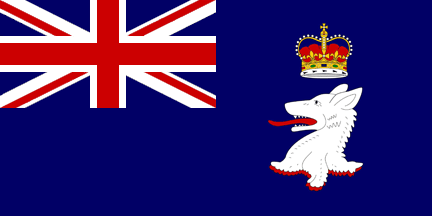
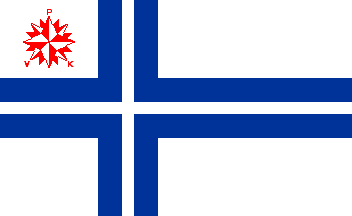
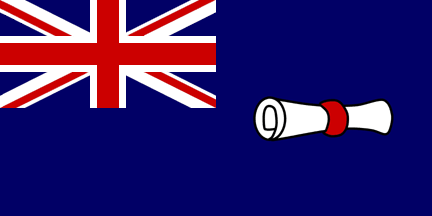
Ensign of the Royal Dee Yacht Club, UK;
Ensign of the Puotilan Venekerho r.y, Finland;
Ensign of the Bar Yacht Club, UK
- YACHT FLAG (or PENNANT)
- An imprecise term covering any flag (or pennant) flown from a pleasure vessel – see
burgee,
club pennant,
dinner flag,
guest on board flag,
meal pennant,
owner absent flag,
prize flag,
racing flag and
‘yacht ensign’ under ensign.
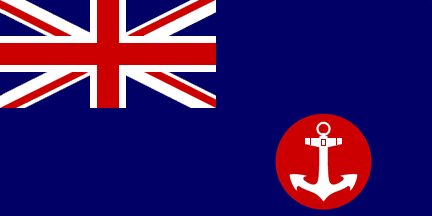
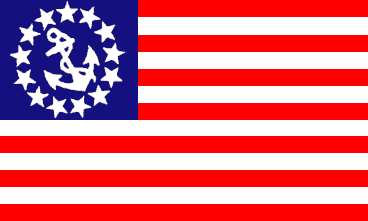
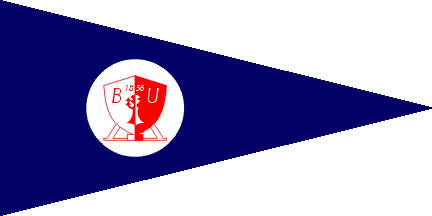
Ensign of the Cruising Association UK;
Yacht Ensign, US;
Burgee of the Uljanik Plovidba Sailing Club, Croatia
- YACHT OFFICER'S BROAD PENNANT (or PENDANT)
- See broad pennant 3) and
officer's pennants.
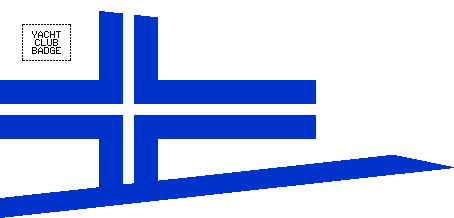
Yacht Club Vice-Commodore’s Broad Pennant, Finland
- YACHT OFFICER'S FLAGS
- See officer’s flags.
![[Yacht Club Commodore flag]](../images/v/vx-us~ycom.gif)
Flag of a Yacht Commodore, US
- YACHT OFFICER'S PENNANT (or PENDANT)
- See officer’s pennants
(also broad pennant 3)).
![[Yacht Club Commodore pennant]](../images/v/vx-ie~nycc.gif)
Pennant of a Yacht Club Commodore, National Yacht Club,
Ireland
- YACHTING CROWN
- In UK usage, a crown formed from various modern yachting sails placed upon a circle or
fillet that appears on the duty ensign and burgee of the British Yachting Association and
is (as far as is known) unique to them – the RYA crown – but see note below (also
fillet 3) and naval crown).
![[RYA burgee]](../images/v/vx-ryaode.gif)
![[RYA duty ensign]](../images/v/vx-ryaodb.gif)
Official Duty Ensign and Burgee of the Royal Yachting Association, UK
(Graham Bartram)
Please note that the defaced ensign and burgee may only be flown by officers of the Association whilst
on official duty, and that ordinary members fly either the house/hoist flag or burgee – see
hoist flag.
- YARD
- A beam or bar attached horizontally to a mast or pole. Formerly used for hoisting
sails in square-rigged vessels, it now supports the halyards from which flags
and signal hoists are displayed (see also
hoist of flags,
mast 2),
sailor’s mast,
signal flag,
stayed mast
and yardarm below).
- YARDARM
- Half a yard, on board ships reference is made to the port or starboard yard
arms to indicate which side of the mast a flag is to be hoisted (see also
battle ensigns,
mast 2) and yard.
Notes
a) On a flag pole or mast fitted with a yard (either
ashore or afloat) the senior position is at the starboard yardarm (this being the right hand side
when looking towards the bow of a ship or the left hand when facing a flag pole ashore).
b) When yards carry more than one halyard on a side, the outermost halyard on the
starboard yardarm (or starboard outer) is the most senior position.
- YELLOW ADMIRAL
- In British usage now obsolete, the colloquial term for an officer who had
been promoted from the rank of post captain, but was thereafter not employed
and had, in essence and in fact, been retired from the active list – an
admiral without distinction of colour – see
distinction of colour
(also blue ensign 2),
flag officer 2),
red ensign 2)
and white ensign 2).
Notes
a) In the Royal navy during the 18th and early 19th centuries,
promotions from and above the rank of post captain were entirely dependent upon seniority regardless of
any talent (or lack of it) in the person concerned,
b) thus at Trafalgar (1805)
Nelson, although commanding a fleet of 27 ships of the line and four frigates, was only a Vice-Admiral
of the White.
- YEOMAN OF SIGNALS
- In British Royal Navy usage and some others, a rating with the rank of Petty Officer who has
specialised in the handling and conducting of flag signals in the communications departments of a
naval vessel (see also
bunting tosser,
flag lieutenant,
flag locker,
flags 1),
signal flag).
- YIN-YANG (or YIN AND YANG)
- An ancient symbol consisting of a circle with two interlinked halves, and intended to represent
complementary opposites within a greater whole – dark and light, male and female or high and low
etc.



National Flag of South Korea;
Flag of Shanghai 1937–1940;
Flag of Isezaki, Japan
- Y SHAPE
- See pall.
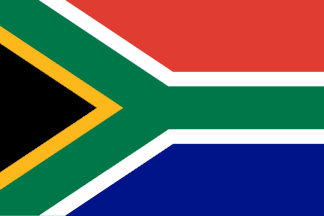
National Flag of South Africa






![[Yacht Club Commodore flag]](../images/v/vx-us~ycom.gif)
![[Yacht Club Commodore pennant]](../images/v/vx-ie~nycc.gif)
![[RYA burgee]](../images/v/vx-ryaode.gif)
![[RYA duty ensign]](../images/v/vx-ryaodb.gif)





